| Listing 1 - 10 of 11 | << page >> |
Sort by
|
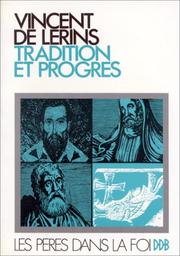
ISBN: 2220021882 9782220021881 Year: 1978 Volume: 7 Publisher: Paris: Desclée De Brouwer,
Abstract | Keywords | Export | Availability | Bookmark
 Loading...
Loading...Choose an application
- Reference Manager
- EndNote
- RefWorks (Direct export to RefWorks)
Book
ISBN: 270101252X 9782701012520 Year: 1992 Volume: 4 Publisher: Paris: Beauchesne,
Abstract | Keywords | Export | Availability | Bookmark
 Loading...
Loading...Choose an application
- Reference Manager
- EndNote
- RefWorks (Direct export to RefWorks)
Christian heresies --- Hérésies chrétiennes --- History --- Histoire --- Epiphanius, --- Heresies, Christian --- 276 =75 EPIPHANIUS SALAMINIUS --- -Heresies, Christian --- Heresies and heretics --- Heresy --- Theology, Doctrinal --- Christian sects --- Griekse patrologie--EPIPHANIUS SALAMINIUS --- -Epiphanius Saint, Bp. of Constantia in Cyprus --- -Griekse patrologie--EPIPHANIUS SALAMINIUS --- Hérésies chrétiennes --- Epifaniĭ, --- Epifanio, --- Epipʻan, --- Epiphane, --- Epiphanios, --- Kipratsʻi, Epipʻan, --- Kipurskiĭ, Epifaniĭ, --- Epiphanius --- Heresies, Christian - History - Early church, ca. 30-600
Book
ISBN: 0664219713 9780664219710 Year: 1993 Publisher: Louisville: Westminster John Knox Press,
Abstract | Keywords | Export | Availability | Bookmark
 Loading...
Loading...Choose an application
- Reference Manager
- EndNote
- RefWorks (Direct export to RefWorks)
Classical literature --- Heresies, Christian --- History and criticism. --- History --- -Heresies, Christian --- -273 --- Heresies and heretics --- Heresy --- Theology, Doctrinal --- Christian sects --- Literature, Classical --- Literature --- Literature, Ancient --- Greek literature --- Latin literature --- History and criticism --- -Schisma's. Ketterijen --- Christian heresies --- 273 --- Schisma's. Ketterijen --- Bible --- Criticism, interpretation, etc. --- Biblia --- Classical literature - History and criticism. --- Heresies, Christian - History - Early church, ca. 30-600.
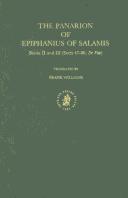
ISBN: 9004079262 9004098984 9004439668 9004438971 9789004079267 9789004098985 9789004439665 9789004438972 Year: 1993 Volume: 36 35 Publisher: Leiden;Boston BRILL
Abstract | Keywords | Export | Availability | Bookmark
 Loading...
Loading...Choose an application
- Reference Manager
- EndNote
- RefWorks (Direct export to RefWorks)
Epiphanius, bishop of Salamis on Cyprus from about 367 until 402, was a witness to and participant in the troubled era after the Council of Nicaea. His Panarion, or "Medicine Chest," is an historical encyclopedia of ideas and movements he considered heretical, and of the replies Christians ought to make to them. Book II and III deal with the Trinity, the Person of Christ, the divinity and personality of the Holy Spirit, Manichaeism, penance, matrimony and celibacy, monastic regulations, the Christian Calendar, all hotly contested topics in the fourth century. Book I, issued by Brill in 1987, concerns Gnosticism and Jewish Christianity. Together, the two volumes are the only complete translation of the Panarion in a modern language.
-Gnosticism --- Gnosticism --- Heresies, Christian --- -Heresies, Christian --- Heresies and heretics --- Heresy --- Theology, Doctrinal --- Christian sects --- History --- Christian heresies --- Primitive and early church, ca. 30-600 A.D. --- Hérésies. 4e s. (Sources) --- Ketterijen. 4e eeuw. (Bronnen) --- -Cults --- -Christian heresies --- Cults --- Apologetics --- Apologetics. --- Apologetics, Missionary --- Christian evidences --- Christianity --- Evidences, Christian --- Evidences of Christianity --- Fundamental theology --- Polemics (Theology) --- Theology, Fundamental --- Religious thought --- Theology --- Evidences --- Heresies, Christian - History - Early church, ca. 30-600 --- -Hérésies chrétiennes --- Gnosticisme --- Histoire --- Hérésies chrétiennes --- 0030-0600 (église primitive) --- -History
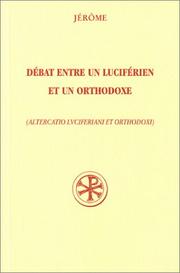
ISBN: 2204071153 9782204071154 Year: 2003 Volume: 473 Publisher: Paris: Cerf,
Abstract | Keywords | Export | Availability | Bookmark
 Loading...
Loading...Choose an application
- Reference Manager
- EndNote
- RefWorks (Direct export to RefWorks)
Classical Latin literature --- Christian apologetics --- Patrology --- Apologetics --- Christian heresies --- Apologétique --- Hérésies chrétiennes --- Early works to 1800 --- History --- Ouvrages avant 1800 --- Histoire --- Lucifer, --- Heresies, Christian --- #GGSB: Latijnse patrologie (studie) --- #GGSB: Latijnse patrologie (tekst) --- 273.922 --- -Heresies, Christian --- Heresies and heretics --- Heresy --- Theology, Doctrinal --- Christian sects --- Apologetics, Missionary --- Christian evidences --- Christianity --- Evidences, Christian --- Evidences of Christianity --- Fundamental theology --- Polemics (Theology) --- Theology, Fundamental --- Religious thought --- Theology --- Luciferianen --- -Evidences --- Lucifer Bishop of Cagliari --- -Luciferianen --- -Lucifer Bishop of Cagliari --- -273.922 Luciferianen --- Apologétique --- Hérésies chrétiennes --- 273.922 Luciferianen --- Calaritanus, Luciferus, --- Lucifero, --- Luciferus, --- Luzifer, --- Lucifer Calaritanus --- Latijnse patrologie (studie) --- Latijnse patrologie (tekst) --- Apologetics - Early works to 1800 --- Heresies, Christian - History - Early church, ca. 30-600
Book
ISBN: 2204082007 9782204082006 Year: 2006 Volume: 504 Publisher: Paris: Cerf,
Abstract | Keywords | Export | Availability | Bookmark
 Loading...
Loading...Choose an application
- Reference Manager
- EndNote
- RefWorks (Direct export to RefWorks)
Classical Latin literature --- Christian church history --- Patrology --- Church history --- Christian heresies --- Eglise --- Hérésies chrétiennes --- History --- Histoire --- Lucifer, --- Heresies, Christian --- #GGSB: Latijnse patrologie (tekst) --- 273.922 --- Luciferianen --- Christian literature --- 17th century --- Critical edition --- 273.922 Luciferianen --- Critical edition. --- Hérésies chrétiennes --- Apostolic Church --- Christianity --- Church, Apostolic --- Early Christianity --- Early church --- Primitive and early church --- Primitive Christianity --- Fathers of the church --- Great Apostasy (Mormon doctrine) --- Calaritanus, Luciferus, --- Lucifero, --- Luciferus, --- Luzifer, --- Lucifer Calaritanus --- Latijnse patrologie (tekst) --- Church history - Primitive and early church, ca. 30-600 --- Heresies, Christian - History - Early church, ca. 30-600
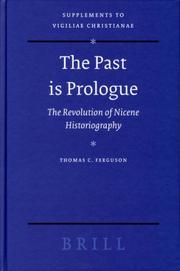
ISSN: 0920623X ISBN: 9004144579 9789004144576 9781429453479 1429453478 143370577X 9781433705779 128086835X 9786610868353 9047407830 9789047407836 Year: 2005 Volume: 75 Publisher: Leiden ; Boston : Brill,
Abstract | Keywords | Export | Availability | Bookmark
 Loading...
Loading...Choose an application
- Reference Manager
- EndNote
- RefWorks (Direct export to RefWorks)
While there has been substantial scholarly work done on the development of Christian doctrine in the fourth and fifth centuries, very little corresponding attention has been paid to the writing of church history during this critical period. This work examines how authors began to construct the historical narrative of the “Arian” controversy and focuses on the interplay between theology and worshipping communities. Major figures such as Eusebius and Athanasius are examined, and important but overlooked figures such as an anonymous non-Nicene chronicler and Philostorgius are also included. In the introduction the book surveys recent developments in the study of “Arianism” and discusses the usefulness of the very category of an “Arian controversy.” Subsequent chapters set forth the thesis that church histories are important sources for understanding the development of doctrine. A chapter is devoted to Eusebius’ Ecclesiastical History, especially the oft-overlooked Book X. Further chapters explore the role of Rufinus as the first extant author to write a continuation of Eusebius. The work also consciously includes marginalized non-Nicene sources, and there are chapters which examine an anonymous non-Nicene chronicler and the Ecclesiastical History of the Eunomian Philostorgius of Borissus. The book is particularly useful for persons interested in examining the development of doctrine in the fourth century from fresh perspectives. The work approaches church histories as narrative myths of community origins produced by worshipping communities standing in continuity to local schools of thought.
Theology, Doctrinal --- Heresies, Christian --- Church history --- History --- Historiography. --- Christian heresies --- Théologie dogmatique --- Hérésies chrétiennes --- Eglise --- Historiography --- Histoire --- Historiographie --- Primitive and early church, ca. 30-600 A.D. --- Heresies and heretics --- Heresy --- Christian sects --- Christian doctrines --- Christianity --- Doctrinal theology --- Doctrines, Christian --- Dogmatic theology --- Fundamental theology --- Systematic theology --- Theology, Dogmatic --- Theology, Systematic --- Theology --- Doctrines --- Theology, Doctrinal - History - Early church, ca. 30-600 - Historiography. --- Heresies, Christian - History - Early church, ca. 30-600 - Historiography. --- Church history - Primitive and early church, ca. 30-600 - Historiography.
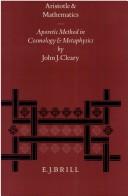
ISBN: 9004096167 9004320768 9789004096165 9789004320765 Year: 1992 Volume: 56 Publisher: Leiden ;New York E.J. Brill
Abstract | Keywords | Export | Availability | Bookmark
 Loading...
Loading...Choose an application
- Reference Manager
- EndNote
- RefWorks (Direct export to RefWorks)
The study of the Elenchos (c. 225 CE) involves the whole range of ancient interpretative traditions concerned with Greek Philosophy, from Aristotle to the Late Neoplatonists. The present inquiry places Hippolytus' important reports about the Greek philosophers in the context of these traditions and so is able to illuminate not only what he has to offer but also to increase our knowledge of the traditions he depends on. For him the Pythagoreanizing current in Pre-Neoplatonism is of paramount importance. Accordingly, he constructs a succession ( diadoche ) starting with Pythagoras and including Empedocles, Heraclitus, Plato, Aristotle and the Stoics, and argues that the diadoche of the Gnostic heresiarchs is parasitical on its Pythagorean predecessor. A new assessment of the sources used — the first serious attempt since that of Diels in 1879 — hinges on an analysis of Hippolytus' method of presentation, which is a blend of cento and exegesis geared to his anti-Gnostic purpose.
Ancient philosophy --- Antieke filosofie --- Filosofie [Antieke ] --- Filosofie [Griekse ] --- Filosofie [Romeinse ] --- Filosofie van de Oudheid --- Greek philosophy --- Griekse filosofie --- Philosophie ancienne --- Philosophie antique --- Philosophie de l'Antiquité --- Philosophie grecque --- Philosophie romaine --- Philosophy [Ancient ] --- Philosophy [Greek ] --- Philosophy [Roman ] --- Roman philosophy --- Romeinse filosofie --- Christian heresies --- Philosophy, Ancient --- Hérésies chrétiennes --- History --- Histoire --- Hippolytus, --- Philosophy, Ancient. --- Heresies, Christian --- -Philosophy, Ancient --- Philosophy, Greek --- Philosophy, Roman --- Heresies and heretics --- Heresy --- Theology, Doctrinal --- Christian sects --- -Hippolytus Antipope --- Hérésies chrétiennes --- Primitive and early church, ca. 30-600 A.D. --- Hippolytus, Antipope, ca. 170-235 or 6. Philosophoumena. --- Heresies, Christian - History - Early church, ca. 30-600. --- Early church. --- Philosophoumena (Hippolytus, Antipope) --- Philosophumena (Hippolytus, Antipope) --- Elenchos (Hippolytus, Antipope) --- Exposition of philosophical tenents (Hippolytus, Antipope) --- 30-600 --- Early Church Period --- Primitive and Early Church Period
Book
ISSN: 05750741 ISBN: 2850211206 9782850211201 Year: 2000 Volume: 47 Publisher: Paris: Gabalda,
Abstract | Keywords | Export | Availability | Bookmark
 Loading...
Loading...Choose an application
- Reference Manager
- EndNote
- RefWorks (Direct export to RefWorks)
Heresies, Christian --- Jewish Christians --- History --- 276:22 --- 227.08 --- -Jewish Christians --- -#GOSA:I.NT.Pa.M --- #GOSA:II.P.Alg.M --- Heresies and heretics --- Heresy --- Theology, Doctrinal --- Christian sects --- Christian Jews --- Christians of Jewish descent --- Hebrew Christians --- Messianic Jews --- Christians --- Christian converts from Judaism --- Jews --- Messianic Judaism --- Patrologie en exegese --- Paulinische theologie --- -History --- -Conversion to Christianity --- -276:22 --- 227.08 Paulinische theologie --- 276:22 Patrologie en exegese --- -Christian heresies --- #GOSA:I.NT.Pa.M --- Homilies (Pseudo-Clementine) --- Recognitions (Pseudo-Clementine) --- Anagnōseis (Clementine) --- Pseudo-Clementine Recognitions --- Clementine Recognitions --- Recognitiones (Pseudo-Clementine) --- Hōmiliai (Pseudo-Clementine) --- Homiliae (Pseudo-Clementine) --- Pseudo-Clementine Homilies --- Clementine Homilies --- Pseudo-Clementines, Homiliae --- Christian heresies --- Heresies, Christian - History - Early church, ca. 30-600. --- Jewish Christians - History - Early church, ca. 30-600.
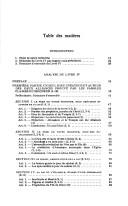
ISBN: 2249601216 2870370474 9782249601217 Year: 1978 Volume: 58 1 Publisher: Paris: Lethielleux,
Abstract | Keywords | Export | Availability | Bookmark
 Loading...
Loading...Choose an application
- Reference Manager
- EndNote
- RefWorks (Direct export to RefWorks)
Authority --- Christian heresies --- Covenant theology --- Tradition (Theology) --- C1 --- theologie --- Covenant of grace --- Covenant of works --- Covenants (Theology) --- Federal theology --- Theology, Covenant --- Theology, Federal --- Covenants --- Theology, Doctrinal --- Political science --- Authoritarianism --- Consensus (Social sciences) --- Religious aspects&delete& --- Christianity --- History --- History of doctrines --- Kerken en religie --- Religious aspects --- Congregational churches --- Presbyterian Church --- Puritans --- Reformed Church --- Irenaeus, --- -Covenants (Theology) --- -Tradition (Theology) --- Heresies, Christian --- -History of doctrines --- Irenaeus Lugdunensis, --- Tradition (Theology). --- History of doctrines. --- Christianity. --- Alliance (Théologie) --- Hérésies chrétiennes --- Autorité --- Tradition (Théologie) --- Histoire des doctrines --- Histoire --- Aspect religieux --- Authority - - Christianity - Religious aspects --- -Covenants (Theology) - - History of doctrines --- Heresies, Christian - History - Early church, ca. 30-600 --- Irenaeus Lugdunensis, - ca 130-ca 202 --- Kerkgeschiedenis --- Irenaeus, Heilige
| Listing 1 - 10 of 11 | << page >> |
Sort by
|

 Search
Search Feedback
Feedback About UniCat
About UniCat  Help
Help News
News